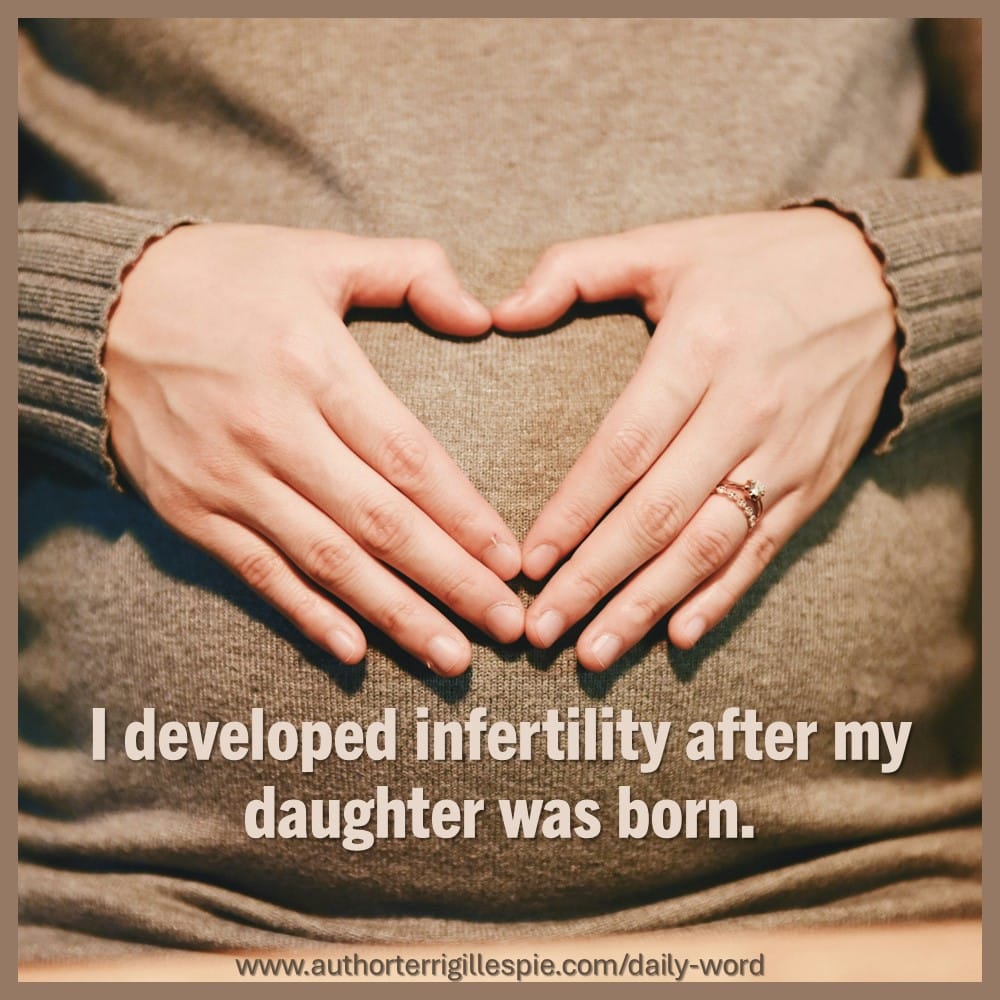Three things are never satisfied, four never say, “Enough!”— Sheol, a barren womb, land that is not satisfied with water, and fire that never says, “Enough!” Proverbs 30:15b-16, TLV
 The Needless Secret Shame. In less than two weeks, millions will be celebrating Mother’s Day. Children and grandchildren will be giving cards, flowers, and gifts to celebrate those who mother.
The Needless Secret Shame. In less than two weeks, millions will be celebrating Mother’s Day. Children and grandchildren will be giving cards, flowers, and gifts to celebrate those who mother.
But, for one in six women, there will be no cards, flowers, or gifts. Infertility occurs in 10-15% of couples. Medical experts believe those numbers will increase because of an increase in estrogen levels from oral contraceptives in the general water supply.
Those fortunate enough to have the finances to afford the various fertility “treatments” are not guaranteed results. The same applies to adoption. Not everyone can afford to adopt a child.
The Needless Secret Shame
One-third of infertility issues stem from the woman, one-third for the man. The final one-third is a problem with both, or the cause is unknown. Regardless of the “fault,” to know over years of grief that we won’t be able to be “fruitful and multiply” is devastating.
For many, especially for women, we can feel shame—that we are somehow to blame. I call it the “Needless Secret Shame.” Despite the small percentage of infertility caused by abortions or medications or illness, women needlessly blame themselves.
I developed infertility after my daughter was born. Later, after my  hysterectomy, my gynecologist said it was a miracle that I was able to conceive at all.
hysterectomy, my gynecologist said it was a miracle that I was able to conceive at all.
Kind of Depressing?
Why am I bringing this up — it’s pretty depressing, isn’t it? I bring it up because we probably all know couples without children—or only one child. We may have assumed it was by choice. Just know, it may not be.
Their repeated “no-shows” at family get-togethers and holidays, or their pasted-on smiles when they do show up are some of the signs. Others are better at hiding the pain.
Ways to Support
If someone trusts you enough to share this difficult journey, it is an honor and can sometimes be a challenge to support them. I checked a few websites* and gleaned the things that would have been helpful to me:
- Ask them what they need. So simple, but whether they are in the rigors of infertility treatments, adoption, or their monthly cycles mean another disappointment, ask them. If they retreat or say, “Nothing.” Respect that and pray. The LORD may lead you to drop off a card or flowers or veggies from your garden. Just show them you are there for them and that you understand as much as possible that the pain is real.
- Say the right things. A simple: “I am so sorry.” or “I’m here to listen if you want to talk.” will go a long way. Nothing profound. Just caring.
- A bit of research can help or hinder. Knowing what your friend is going through physically and emotionally can be helpful. But not if you use the information to advise. Please do not do that. Understanding the infertility or adoption processes helps us to listen better, have more compassion, and to better know how to pray.
What NOT to Do
Even if you can’t do the above things to help your friend, these Don’ts will go a long way in helping.
Don’t say these things:
- Anything that begins with: “At least.” As in: At least it isn’t cancer, or you still have your health, or after a miscarriage: “At least you know you can get pregnant.”
- “You can always.” As in: “You can always adopt” [we weren’t able to]. Or, “You can always try IVF” [we couldn’t afford it]. Please, don’t say this.
- “You’re lucky you don’t have kids — or more kids.” These are like arrows to the heart for your friend, especially if you have a houseful of children. No matter how frustrated you might be on any given day with your own blessings, this is a don’t-go-there.
- “Comforts” that try to minimize the pain. Let them feel it. Pray for them. Our Heavenly Father knows how to comfort your friend in the most intimate of ways. Don’t try to be Him. You will fail.
- Don’t NOT invite them to family events or holidays. Your friend/family member may not be emotionally able to attend all the time, but knowing they have family/support is helpful to the healing process.
- Don’t give advice relating to lifestyle or spiritual improvements. Please don’t say, “Pray harder.” Or “You just have to press in with more faith.” Don’t advise them to lose weight, get more sleep, eat organic, or quit their stressful jobs. Or remind them to watch that they don’t show emotions, because they need to be a good witness to others.
Those don’ts are really important — I know.
 As we approach Mother’s Day, I would like to challenge us to be more observant to the secret shame of infertility. Pray to see if our Father has appointed someone for us to support and/or pray for. It will be a mitzvah [good deed] of the sweetest, healing order.
As we approach Mother’s Day, I would like to challenge us to be more observant to the secret shame of infertility. Pray to see if our Father has appointed someone for us to support and/or pray for. It will be a mitzvah [good deed] of the sweetest, healing order.
Think More About It
Have we struggled with well-meaning friends or family that have hurt us with their “comfort?” What can we learn from these wounds? Do you know someone who has trusted you to be a source of comfort with their struggles with infertility? Can you share ways that you have effectively ministered to them?
Until tomorrow, may we support those who suffer in shame, my friends.
Please continue to pray for Israel, dear friends. God bless you!
—
*Resources:
https://www.verywellfamily.com/how-can-i-support-a-friend-with-infertility-1960033
https://www.mayoclinic.org/diseases-conditions/infertility/symptoms-causes/syc-20354317
https://www.yahoo.com/lifestyle/struggling-infertility-makes-mothers-day-150022295.html



